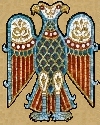 Byzantine Paganism
Byzantine Paganism

 Byzantine Paganism
Byzantine Paganism

Daily Lararium Rite
Click on a title below to visit a section of the Byzantine Pagan site:
![]()
Home
~
History ~
Rituals ~
Priesthood
Documents ~
News
~
Forum ~
Shop ~
Links
~
FAQ
![]()
|
Daily Rite at the Lararium
In Byzantine times this continued for centuries, but again this daily ritual probably would have become shorter and less elaborate as time progressed, just to lessen chance of discovery by those wishing to end Classical Religion itself Our rite here is from the earlier Classical period so is more appropriate as coming from the beginning of the Byzantine era rather than the end. Lararium Daily Ritual The daily household rite should be done by the head of the household (the paterfamilias or materfamilias). Before beginning the rite, fill the Gutus with wine, juice, oil or whatever liquid you wish to offer, and place it on the altar. Also have a small dish with Mola Salsa or spelt flower for offering. I. Begin by ritually washing the hands as purification before touching the altar or sacred tools. II. Light the Lucerna lamp and say a small prayer to the god Ianus (Janus) who presided over doorways, and beginning and endings: "Ianus, God of Portals, I ask that you open the ways so that this rite may reach the Gods" II. Next, hold the Lucerna up in offering, and say a mall prayer to Vesta, Goddess of the Hearth: "Vesta, pure Goddess, Let this rite be pure that it may honor the Gods and this home." III. Now light the Turibulum and place incense on it. Then take up the Gutus and pour a small amount of wine (or offering liquid) into the patera, and offer it to the Lar, the protecting spirit of the family: "Lar of this family, I offer this incense and wine (or oil, etc.), be thou increased! I honor you and ask for continued protection and fortune for this home." IV. Now add a small amount of incense and liquid again for the Penates, the "Gods of the cupboard": "Penates of this house, I offer this incense and wine, be thou increased! I honor you and ask you to bring abundance and plenty to our home and family." V: At this point you may call upon the personal patron deities of yourself and your family, or other deities you wish to honor. You may offer incense, wine, oil, mola salsa, a small portion of the family meal, flowers, etc. For each deity, call their name and make your offering in similar format as above. State your wish that your offering may benefit them, and that they may bring you what you ask in return. For instance, if you were calling upon Jupiter you might say: "Jupiter, Best and Greatest, I offer you this ________, be thou increased! I honor you and ask that you may bring guidance and divine strength to myself, and my household." If you were calling on Merucry, you might say: "Mercury, God of Commerce and Travel, I offer you this _______", be thou increased! I honor you and as that you bring prosperity and clear mind to myself and my household." This may be as elaborate or simple as you like. At the very least it is good to offer wine and incense to each divine power you call, (Lar, Penates, other Deities) and you may make things more elaborate by adding multiple offerings to any or all deities. If you wish to add personal, unscripted words of prayer to any or all Deities after an offering, this is allowed. It is acceptable to speak to the Gods from your heart.
To End the Rite: The Piaculum After all offerings have been made, it is helpful to make a final "offering of expiation" to ensure that any shortcoming or fault in the rite may be forgiven. This is done by taking up a pinch of incense and placing it in the Turibulum, saying: "In honor and respect I offer the Gods this incense in atonement for any fault in this rite." After a pause to respectfully let the smoke from the Piaculum rise, end the rite by saying: "I end this rite in honor and adoration. ITA EST. (It is ended.)" If possible, leave the sacred light in the Lucerna burning for a period of time, anywhere from a few minutes to an hour or two. Offerings may be left at the altar for the same period, before cleaning them away.
|
© Copyright Byzantium Novum, 2022